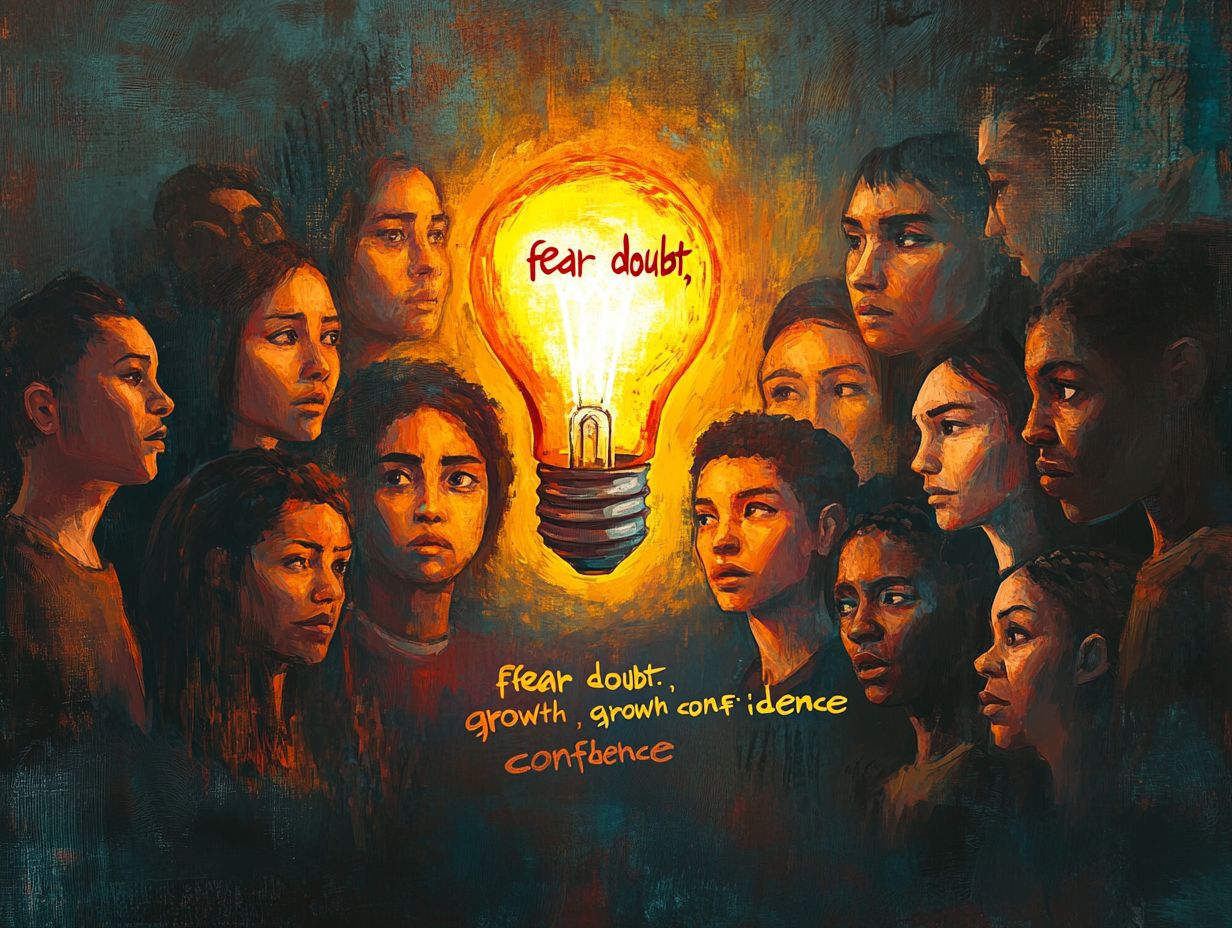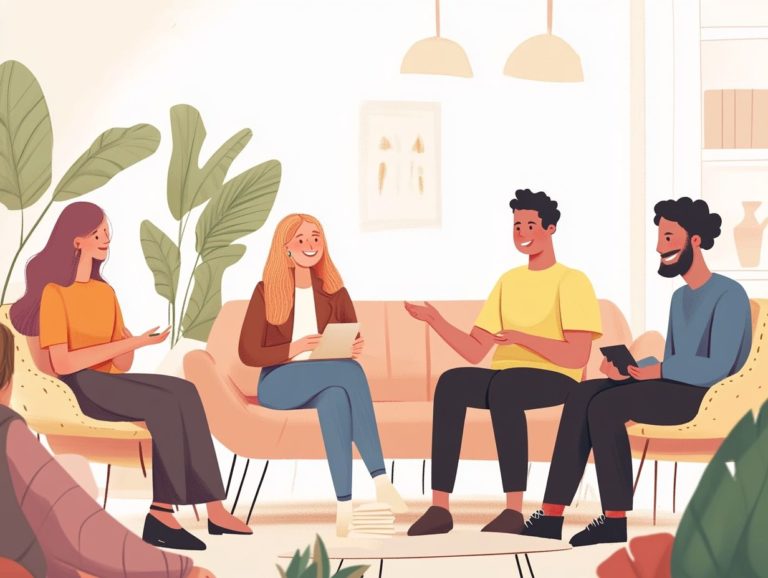How to Recognize and Overcome Limiting Beliefs
Limiting beliefs have a subtle yet profound way of influencing your thoughts, actions, and overall potential, often preventing you from reaching your dreams.
Let s explore limiting beliefs together to see how they shape our lives! This article examines their impact on your life and emphasizes the significance of self-reflection in recognizing them.
You’ll find actionable strategies to overcome these barriers, alongside resources like therapy and coaching that can aid you on your journey.
By understanding and confronting these beliefs, you can unlock a more empowered version of yourself.
Contents
- Key Takeaways:
- Understanding Limiting Beliefs
- The Impact of Limiting Beliefs
- Recognizing Your Own Limiting Beliefs
- Overcoming Limiting Beliefs
- Support and Resources for Overcoming Limiting Beliefs
- Frequently Asked Questions
- What are limiting beliefs?
- How do I recognize limiting beliefs in myself?
- What are some common examples of limiting beliefs?
- How can I overcome limiting beliefs?
- Can limiting beliefs be changed?
- What are some techniques to overcome limiting beliefs?
- What are limiting beliefs?
- How do I recognize limiting beliefs in myself?
- What are some common examples of limiting beliefs?
Key Takeaways:
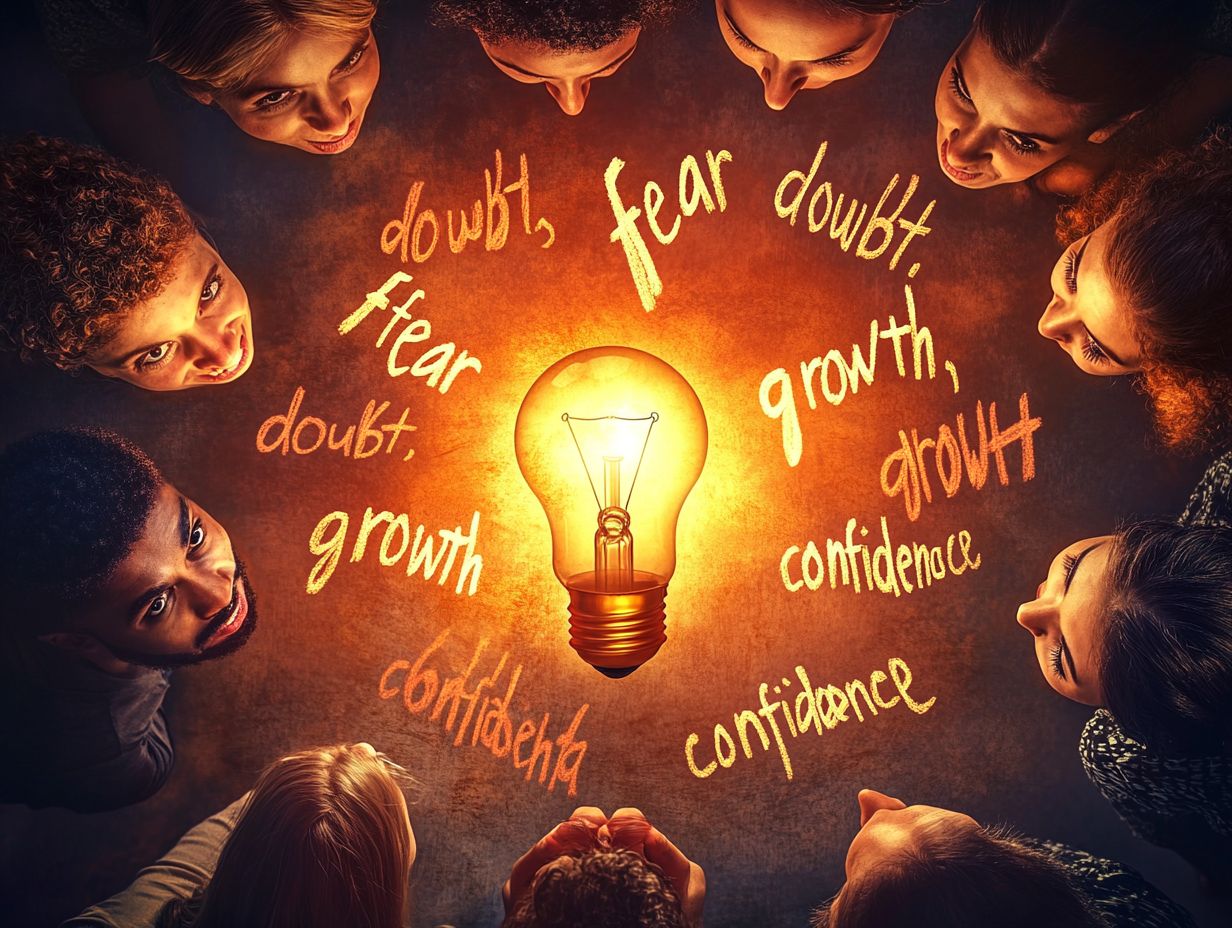
Limiting beliefs restrict our potential and hold us back from achieving our goals.
Self-reflection and awareness are crucial in recognizing and challenging our own limiting beliefs.
Don t wait! Seek support through therapy or coaching today to break free from limiting beliefs.
Understanding Limiting Beliefs
Understanding limiting beliefs is a pivotal step in your personal development journey. These self-imposed barriers can significantly influence your mental health and overall self-awareness.
By recognizing how these beliefs arise from past negative experiences and emotional attachments, you can initiate a transformative process of self-improvement.
It s vital for you to cultivate curiosity and challenge the beliefs that have been ingrained through authority figures or familial influences. This exploration paves the way for greater emotional resilience.
It allows you to elevate your mindset, creating an organized environment that nurtures growth.
Defining and Identifying Limiting Beliefs
Defining and identifying limiting beliefs means recognizing those self-imposed barriers that hold you back from personal growth.
It s essential to assess your behavior using techniques like cognitive behavioral therapy, a way to understand and change your thoughts and behaviors, to gain clarity.
By taking the time to reflect on your past experiences and examine your thoughts, you can uncover the deeply ingrained assumptions you hold about your abilities.
For example, you might think you’re not good enough to seek that promotion or embark on a new career path.
Journaling can be a game-changer in this journey. As you write down your thoughts and feelings, you ll start to notice patterns in your mindset.
Employing assessment tools like the ‘Belief Inventory’ can help you categorize these beliefs, making it easier to identify them clearly.
This structured approach enables you to challenge those restrictive thoughts, paving the way for meaningful self-improvement.
The Impact of Limiting Beliefs
The influence of limiting beliefs on you can be deeply significant. They shape your mental health, self-esteem, and overall success across various facets of life.
These beliefs can hinder your opportunities for development and personal growth, subtly but powerfully constraining your potential.
How Limiting Beliefs Affect Our Lives
Limiting beliefs profoundly shape your life. They influence your emotional responses and reactions to negative experiences.
For instance, you might hesitate to pursue a specific career path. This is due to a belief that you re not good enough, which can cause you to overlook valuable opportunities.
In relationships, these beliefs can manifest as a fear of intimacy. This leads you to sabotage promising connections because you doubt your worthiness of love.
You may even shy away from social situations, firmly convinced that others will judge or reject you.
Each of these scenarios illustrates how such internal narratives not only impede your personal growth but also fracture your connections with others, perpetuating a cycle of self-doubt and isolation.
Recognizing Your Own Limiting Beliefs
Recognizing your own limiting beliefs is an essential journey that demands self-reflection and a profound level of self-awareness.
It invites you to delve into the curiosity of your inner self, enabling you to uncover the core beliefs that may be holding you back from reaching your full potential.
Self-Reflection and Awareness
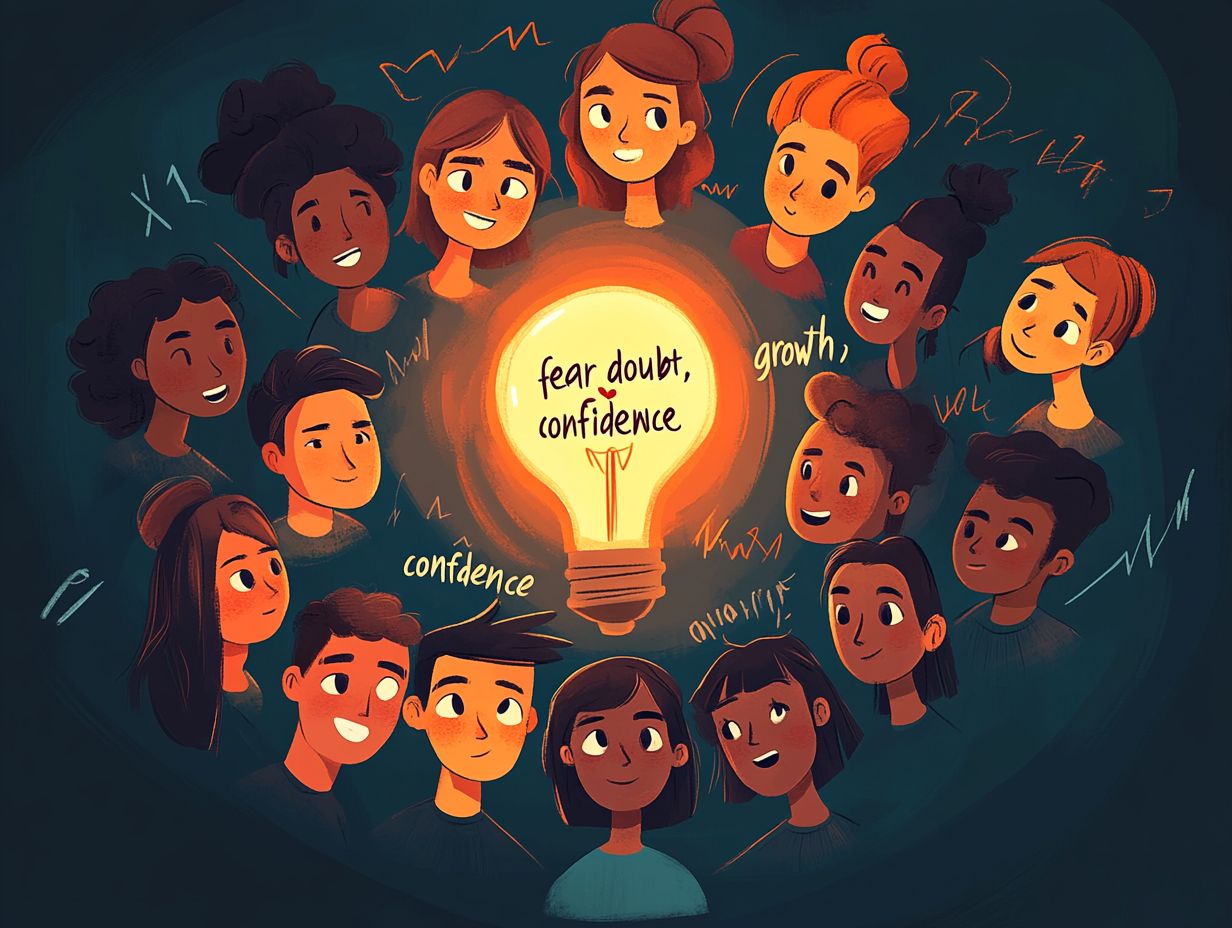
Self-reflection and awareness are invaluable tools for building emotional resilience and enhancing your self-esteem. These practices help you face your limiting beliefs head-on!
Engaging in activities like journaling allows you to delve deeper into your personal thoughts and emotions, leading to a clearer understanding of yourself. This reflective process encourages you to document your feelings, identify recurring patterns, and recognize the triggers that influence your emotional landscape.
Mindfulness also plays a pivotal role in enhancing your self-awareness. It promotes a non-judgmental observation of your thoughts and feelings as they arise, creating space for understanding and acceptance.
Use these techniques daily. They will help you build a resilient mindset that enables you to navigate challenges with greater ease, all while fostering a positive self-image.
Overcoming Limiting Beliefs
Overcoming limiting beliefs is entirely within your reach, and there are several effective strategies to guide you.
Start by challenging the beliefs that hold you back, fostering a growth mindset, and employing positive affirmations to transform your thought patterns.
Embrace these techniques, and watch as you break free from constraints and unlock your full potential.
Strategies for Challenging and Changing Beliefs
Strategies for challenging and transforming beliefs often draw upon cognitive-behavioral therapy techniques that foster self-discovery and elevate self-esteem.
By engaging in practices like reframing your thoughts, you can shift your perspective from a fixed mindset to one that embraces growth and improvement. Mindfulness techniques, including guided meditation and journaling, provide a deeper awareness of harmful thought patterns, allowing for meaningful reflection on your beliefs.
Incorporating affirmations into your daily routine can also help replace negative self-talk with supportive, enabling narratives. Altogether, these methods help you recognize your innate potential and lay the foundation for lasting change in your understanding of self-worth.
Support and Resources for Overcoming Limiting Beliefs
Support and resources for overcoming limiting beliefs are abundant, offering a range of avenues such as therapy, coaching, and self-help techniques.
These tools enable you on your journey toward self-discovery and personal growth, helping you break free from constraints and embrace your true potential.
Therapy, Coaching, and Self-Help Techniques
Therapy, coaching, and self-help techniques serve as essential resources for building emotional resilience and overcoming limiting beliefs.
These approaches create a structured environment where you can delve into your thoughts and feelings, gain valuable insights, and implement positive changes.
In the realm of therapy, options like cognitive-behavioral therapy (CBT), a type of therapy that helps you change negative thought patterns, and dialectical behavior therapy (DBT) are designed to enhance your emotional regulation and challenge those pesky negative thought patterns.
Coaching often emphasizes goal-setting and motivation, enabling you to pursue personal growth and development.
Self-help techniques, including mindfulness practices and journaling, can further support your journey toward emotional well-being.
By harnessing these diverse tools, you can nurture your ability to bounce back from adversity and cultivate a healthier mindset.
Frequently Asked Questions
What are limiting beliefs?
Limiting beliefs are negative thoughts that stop you from reaching your full potential. These self-imposed limitations can be about yourself, others, or the world around you and can greatly impact your actions and decisions.
How do I recognize limiting beliefs in myself?
One way to recognize limiting beliefs is to pay attention to your inner dialogue and the language you use. If you often say things like “I can’t” or “I’m not good enough,” these may be signs of limiting beliefs. Other signs include fear, doubt, and self-sabotage.
What are some common examples of limiting beliefs?
Common limiting beliefs include “I’m not smart enough,” “I don’t have enough experience,” “I’ll never be successful,” and “I’m not worthy of love or happiness.” These beliefs can vary from person to person, but they all have one thing in common they hold you back from achieving your goals and living your best life.
What limiting beliefs have you overcome? Share your journey with us!
How can I overcome limiting beliefs?
Start by identifying your limiting beliefs. Recognizing them is key to challenging and reframing these thoughts.
Consider seeking support from a therapist, coach, or a trusted friend. They can guide you through this journey.
Can limiting beliefs be changed?
Absolutely! Limiting beliefs can be transformed into empowering ones.
While it requires time and effort, maintaining a growth mindset can make a significant difference.
What are some techniques to overcome limiting beliefs?
Techniques include positive self-talk, visualization, and taking small steps toward your goals.
Also, challenge your beliefs with evidence and surround yourself with positive, supportive people.
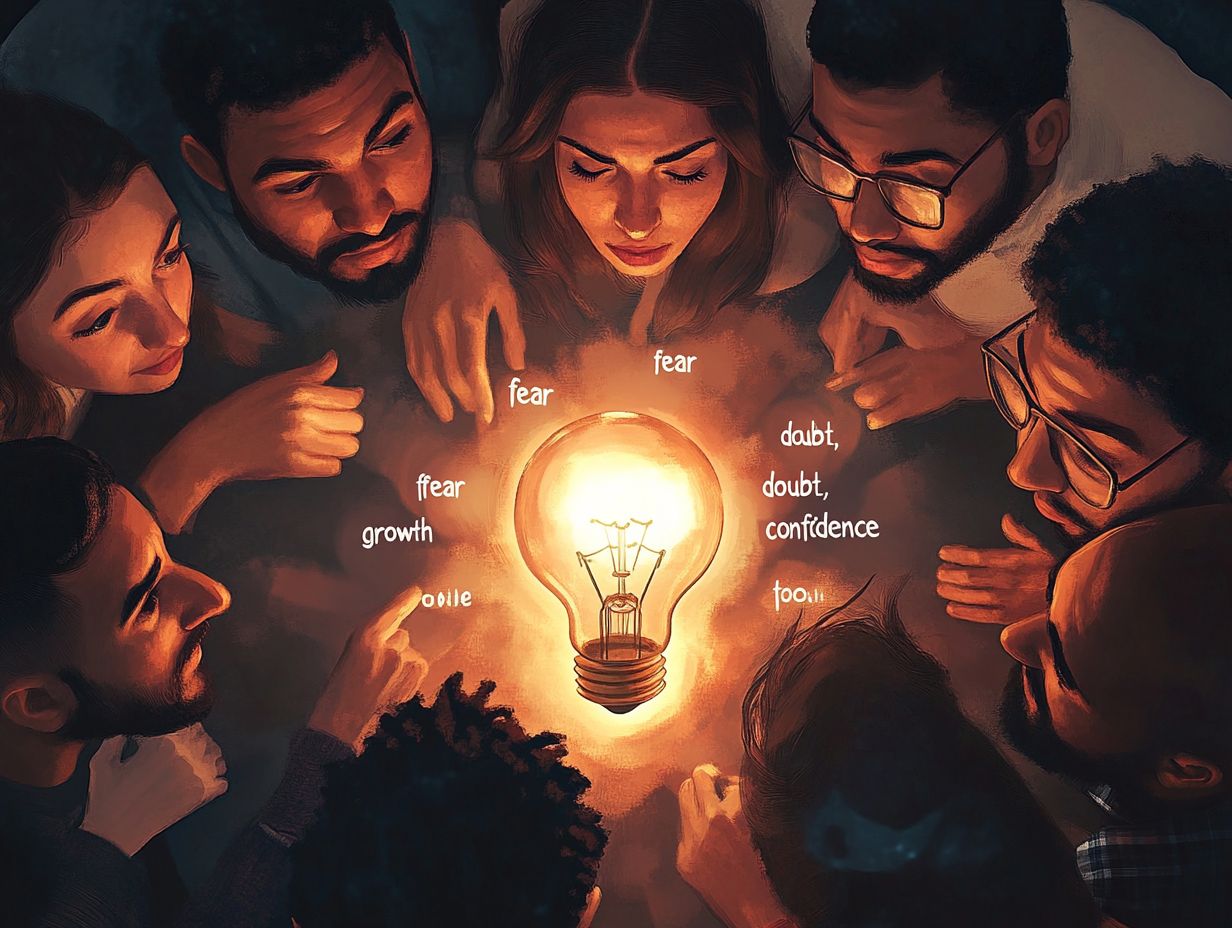
What are limiting beliefs?
Limiting beliefs are negative thoughts or beliefs that hold us back from reaching our full potential. These self-imposed limitations can relate to ourselves, others, or the world around us, greatly impacting our actions and decisions.
How do I recognize limiting beliefs in myself?
Pay attention to your inner dialogue and the language you use. Phrases like “I can’t” or “I’m not good enough” may indicate limiting beliefs.
Other signs include feelings of fear, doubt, and self-sabotage.
What are some common examples of limiting beliefs?
Common limiting beliefs include “I’m not smart enough,” “I don’t have enough experience,” “I’ll never be successful,” and “I’m not worthy of love or happiness.”
These beliefs vary from person to person, but they all share one common feature: they hinder us from achieving our goals and living our best lives.
